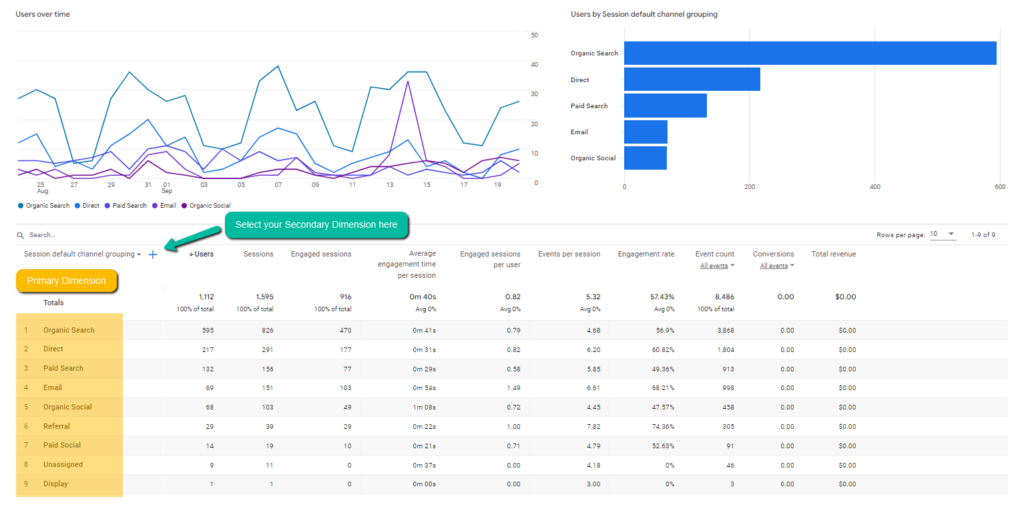Transform Your Analytics Method With Second Measurement in Google Analytics
By integrating secondary measurements into data analysis, a brand-new layer of insights arises, dropping light on detailed individual actions and interactions. The critical application of secondary dimensions holds the crucial to unlocking a treasure trove of important info that can reinvent how organizations translate and act upon their data.
Recognizing Secondary Dimensions in Google Analytics
Second dimensions in Google Analytics offer added context to primary information by permitting users to examine metrics throughout a second dimension, supplying deeper insights right into user behavior and communications on a website. Secondary Dimension in Google Analytics. While main measurements give essential information factors such as pageviews, bounce price, and session duration, second dimensions offer a more thorough view by segmenting the primary data additionally. This division allows individuals to assess metrics in combination with one more measurement, such as website traffic resources, demographics, or individual habits
Advantages of Utilizing Additional Measurements
Using secondary dimensions in Google Analytics offers a critical advantage by boosting the depth of analysis and offering a more comprehensive understanding of individual communications and actions on an internet site. By including second measurements, experts can obtain important insights into the efficiency of specific sectors or variables within their information. This makes it possible for a much more comprehensive evaluation of customer actions beyond surface-level metrics, allowing for a deeper expedition of the variables affecting customer engagement and conversions.

How to Apply Second Dimensions
When integrating secondary dimensions in Google Analytics, one essential step is to pick the appropriate metrics and measurements to improve the evaluation process. Clicking on this button will certainly open up a drop-down food selection listing different dimensions that can be added to your key dimension for deeper insights.
After selecting the appropriate secondary measurement, such as 'Source/Medium' or 'Tool Group,' Google Analytics will show the data in a much more comprehensive layout, allowing you to cross-analyze various facets of customer behavior. Bear in mind to try out different mixes of additional and primary dimensions to discover valuable patterns and trends that can notify your marketing strategies. By implementing second dimensions thoughtfully, you can gain an extra thorough understanding of your site or app efficiency and make data-driven decisions to optimize your electronic existence.
Analyzing Data With Second Measurements
Improve your data evaluation in Google Analytics by including additional dimensions to delve deeper into customer behavior patterns and optimize your electronic advertising and marketing methods successfully - Secondary Dimension in Google Analytics. he has a good point By including second dimensions to your key information, you can acquire important insights that can help you make notified decisions about your internet site or application efficiency
Analyzing data with second measurements allows you to sector your primary information further, offering a much more extensive sight of user interactions. As an example, incorporating the primary measurement of 'source/medium' with a second measurement like 'landing web page' can disclose which specific pages are driving website traffic from various resources. This info can be instrumental in improving your material technique or maximizing your advertising projects to enhance conversions.
Moreover, utilizing second dimensions allows you to determine correlations in between different metrics, helping you comprehend the effect of different factors on individual actions. Whether it's examining demographics along with user engagement metrics or gadget classifications with conversion prices, second dimensions empower you to reveal hidden patterns and patterns that can lead your advertising initiatives.
Maximizing Efficiency With Additional Dimensions
To enhance the performance of data analysis and decision-making in Google Analytics, integrating second measurements is key to maximizing performance metrics and getting deeper understandings into user behavior patterns. By making use of second dimensions, experts can dive beyond surface-level data and reveal valuable connections that might or else go unnoticed. This optimization strategy enables services to customize their advertising efforts more effectively, recognize areas for enhancement in site functionality, and improve overall individual experience.
Second dimensions use an even more extensive sight of individual interactions by offering additional context to primary data metrics. Coupling the primary dimension of 'landing page' with an additional measurement like 'device group' can disclose whether certain tools are extra most likely to drive interaction on specific landing pages. This understanding can inform responsive layout improvements or targeted marketing strategies to improve performance.

Verdict
In verdict, the integration of second measurements in Google Analytics gives businesses with a powerful tool to boost their analytics approach. Secondary Dimension in Google Analytics. By delving deeper right into individual behavior and communications, marketing experts can reveal valuable insights that can drive efficiency optimization and boost the total customer experience. Leveraging second measurements allows for a more thorough evaluation of data, my website causing even more educated decision-making and customized advertising and marketing efforts
Additional measurements in Google Analytics give added context to key information by enabling users to examine metrics throughout a 2nd measurement, using deeper insights right into customer actions and communications on a website. While main measurements provide essential information factors such as pageviews, bounce rate, and session duration, additional dimensions additional resources use an even more thorough view by segmenting the main data better.One of the crucial advantages of using secondary measurements is the ability to discover correlations and patterns that might not be promptly noticeable when analyzing information with main dimensions alone.When integrating secondary dimensions in Google Analytics, one important action is to pick the appropriate metrics and dimensions to enhance the evaluation procedure. Combining the main dimension of 'landing web page' with an additional measurement like 'gadget category' can expose whether particular devices are much more most likely to drive engagement on particular touchdown web pages.
Comments on “Step-by-Step Guide: Leveraging Secondary Dimension in Google Analytics”